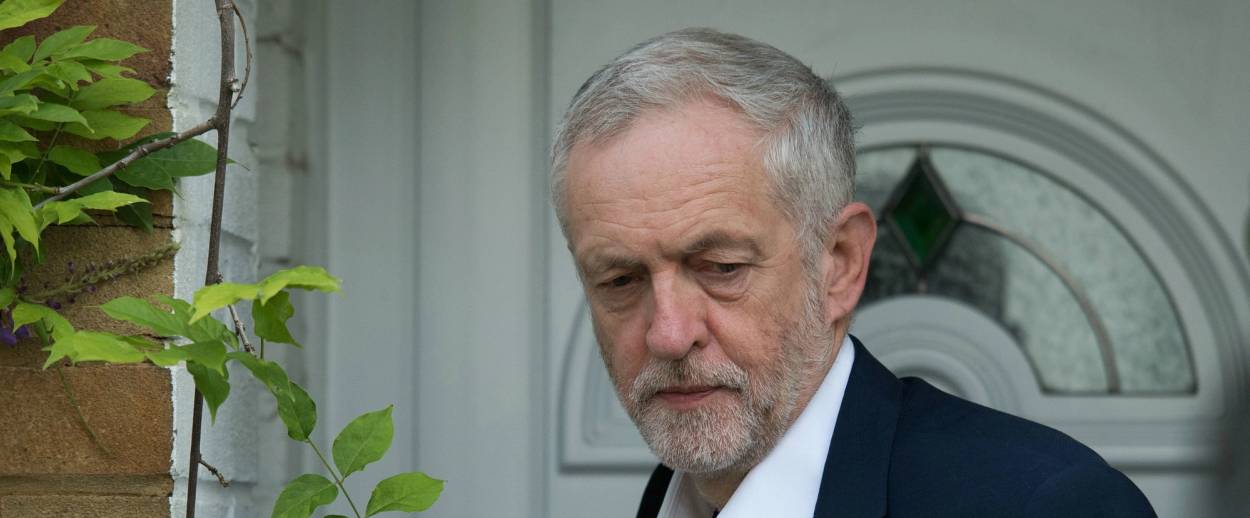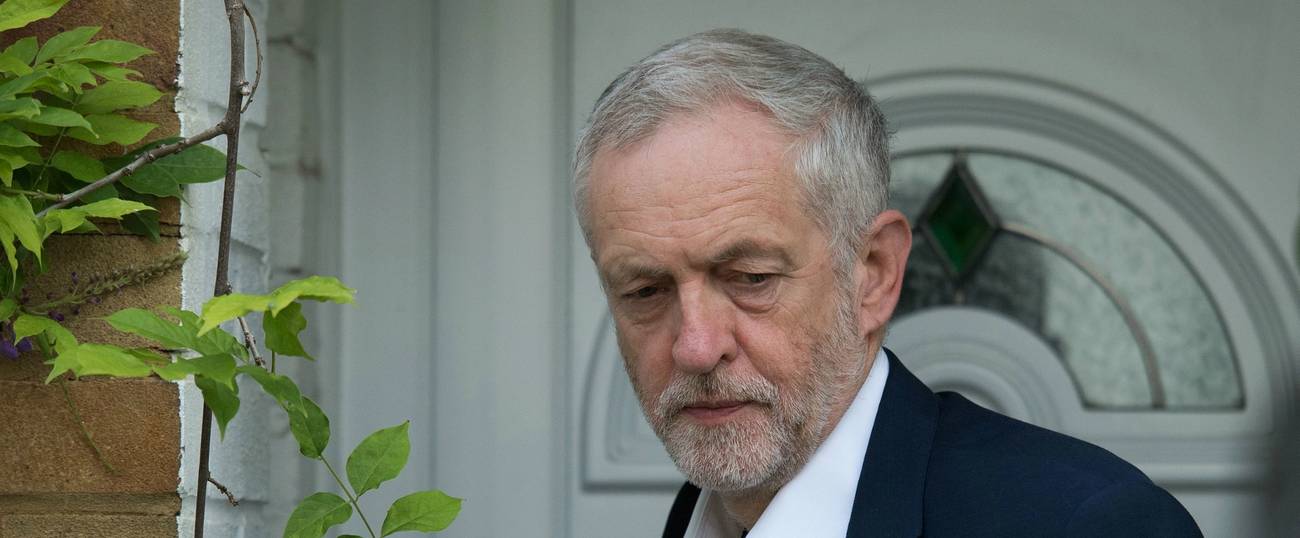Labour Party Leader Jeremy Corbyn Loses No Confidence Vote By Stunning 172-40 Margin
Naturally, his supporters quickly blame the results on a ‘Zionist plot’




Yesterday, the British Labour party’s members of parliament voted no confidence in leader Jeremy Corbyn by a 172-40 margin. The vote came in the wake of the resignation of almost the entirety of Corbyn’s shadow cabinet. Though the vote is non-binding, and Corbyn has vowed to stay on, it could be the prelude to a historic split in the Labour party.
Of course, Corbyn had already lost the confidence of much of Britain’s Jewish community some time ago. As Tablet recounted in September, before becoming Labour leader, Corbyn had:
• Donated to the organization of Paul Eisen, a Holocaust denier, and appeared at his events. He later claimed he was unaware of Eisen’s unsavory views, despite 15 years of association.
• Defended vicar Stephen Sizer, who disseminated materials arguing the Mossad did 9/11, after he was banned from social media by the Church of England for posting anti-Semitic material.
• Praised preacher Raed Salah and invited him to parliament. Salah claims that Jews make their Passover matzoh with gentile blood, that Jews had foreknowledge of 9/11, and that homosexuality is “a great crime.” He has been banned from the U.K. for anti-Semitic incitement.
• Invited activist Dyab Abou Jahjah to parliament and spoke alongside him. Abou Jahjah had called the 9/11 attacks “sweet revenge,” said Europe made “the cult of the Holocaust and Jew-worshiping its alternative religion,” and called gays “Aids-spreading faggots.” He is now banned in the U.K.
• Campaigned for the release of Jawad Botmeh and Samar Alami, who were convicted in Britain in 1996 for bombing the Israeli Embassy in London and one of the country’s largest Jewish charities.
After Corbyn was elected leader, anti-Semitism predictably blossomed among his supporters and inner circle. A series of Labour officials had to be suspended after it was revealed that they’d posted anti-Semitic content on social media. Among other exploits, these individuals disseminated claims that Israel controlled ISIS, blamed the Jewish state for perpetrating the Sandy Hook massacre, and argued that a Jewish banking conspiracy ran Britain. Most famously, Corbyn’s personally-appointed confidante Ken Livingstone, a former mayor of London, had to be suspended from the party after repeatedly insisting that Hitler “supported Zionism.”
Prominent lifelong Jewish Labour voters soon expressed no confidence in Corbyn’s concern for their welfare. “Labour has a problem with anti-Semitism and a leader who does not seem to care enough about it,” wrote Financial Times editor Robert Shrimsley, in a representative column. “Until now my religious background has never been a factor in how I voted. But Mr Corbyn has turned me into a ‘political Jew.’ I, like many British Jews, now feel as I imagine the gay community must have done when Margaret Thatcher passed the homophobic section 28—that one of the two main parties has turned against me.”
“Thanks to Corbyn, the Labour party is expanding, attracting many leftists who would previously have rejected it or been rejected by it. Among those are people with hostile views of Jews,” wrote Guardian editor Jonathan Freedland. “The question for Labour now is whether any of this matters. To those at the top, maybe it doesn’t. But it feels like a painful loss to a small community that once looked to Labour as its natural home—and which is fast reaching the glum conclusion that Labour has become a cold house for Jews.”
It was not Corbyn’s unsavory associations with anti-Jewish ideologues that did him in, however, or his dismissive approach to anti-Semitism among his supporters, or his hostility towards those reporters who wrote about it. Rather, what finally caused Labour to turn on Corbyn in such overwhelming fashion was his perceived sabotage of the party’s campaign to stay in the European Union.
In the wake of the Brexit vote, Labour party leaks revealed that Corbyn’s own communications head Seamus Milne had deliberately minimized pro-EU portions of the Labour leader’s speeches. While putatively supporting Remain, Corbyn himself publicly downplayed the damage that Britain’s exit from the EU would cause its economy, deriding the warnings of experts. He also refused to appear alongside Prime Minister David Cameron to project a bipartisan unified front in support of EU membership. Citing this conduct, and its disastrous consequences in the Brexit referendum, the Labour party’s politicians moved to oust Corbyn. Today, every single Labour member of the European Parliament called on him to resign in a public letter, citing his two-faced EU referendum campaign.
Unsurprisingly, despite this explicit rationale, the resounding rejection of Corbyn was quickly cast as a “Zionist plot” by some of his most zealous supporters. One non-Jewish Labour MP and Corbyn critic aired her frustration with these bigoted accusations on Twitter:
Dear people sending me emails saying I am part of a Zionist plot. Stop it.
— Jess Phillips MP (@jessphillips) June 26, 2016
Hi @PeoplesMomentum this has come from your email address “people like me brought out with Zionist money.” pic.twitter.com/dzxED9rrPQ
— Jess Phillips MP (@jessphillips) June 27, 2016
(These critics did not detail just how much “Zionist money” it took to buy off 172 of Labour’s 216 MPs.)
For his part, Corbyn has vowed to remain in his position, and has characteristically not rebuked the anti-Semitic conspiracy theorists defending him. His stance struck a noticeably jarring contrast with that of Sadiq Khan, Labour’s newly elected Muslim mayor of London, who published an op-ed on Monday pledging to combat anti-Semitism, and who has previously critiqued Corbyn’s approach to the issue.
One person who has clearly had enough of Corbyn is Prime Minister David Cameron, who himself announced his resignation after the Brexit vote. Perhaps no longer feeling quite so constrained by the typical political pieties of his position, Cameron unloaded on Corbyn in this morning’s Prime Minister’s Questions in parliament:
David Cameron to Jeremy Corbyn: “For heavens sake man, go!” #pmqspic.twitter.com/f2kKoiseSE
— BuzzFeed UK Politics (@BuzzFeedUKPol) June 29, 2016
Previous: Jeremy Corbyn Slams Jewish Journalist for Writing About Anti-Semitism in Labour Party
Labour Officials Suspended After Claiming Jews Were Behind African Slave Trade, Israel Behind ISIS
Labour Party Suspends Three More Officials for Anti-Semitism
The Anti-Semitism Scandal Engulfing the Labour Party Was Entirely Predictable
Meet Jeremy Corbyn, the New Leader of Britain’s Labour Party
Yair Rosenberg is a senior writer at Tablet. Subscribe to his newsletter, listen to his music, and follow him on Twitter and Facebook.